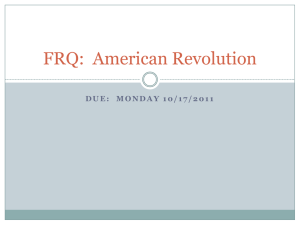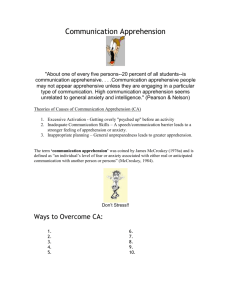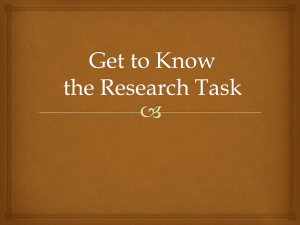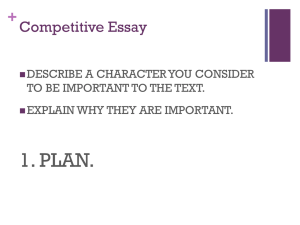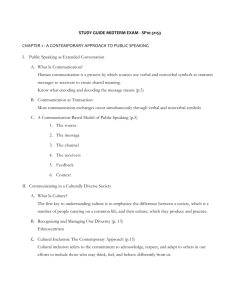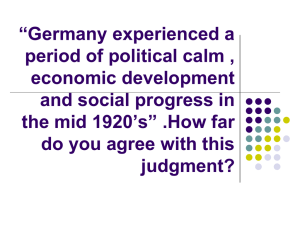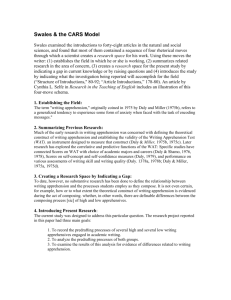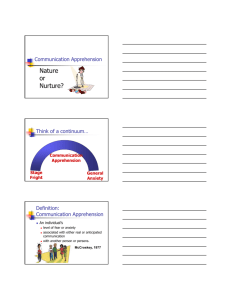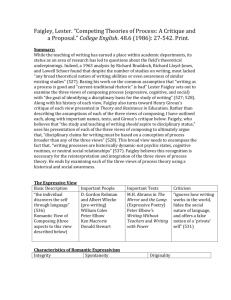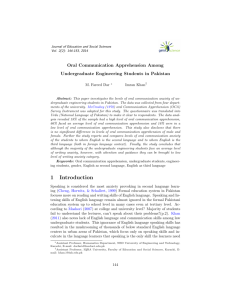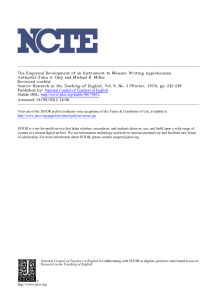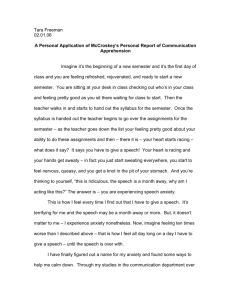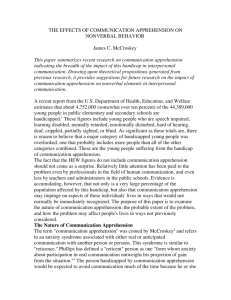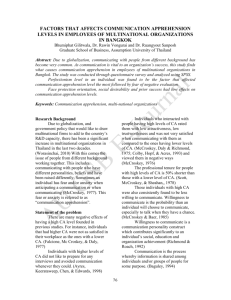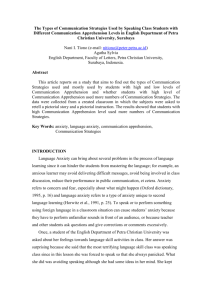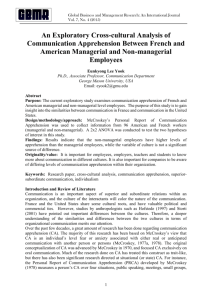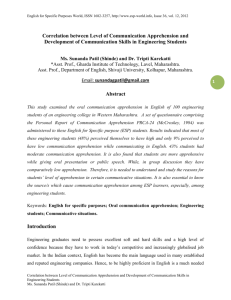Teaching Assistantship for English Composition Application form
advertisement
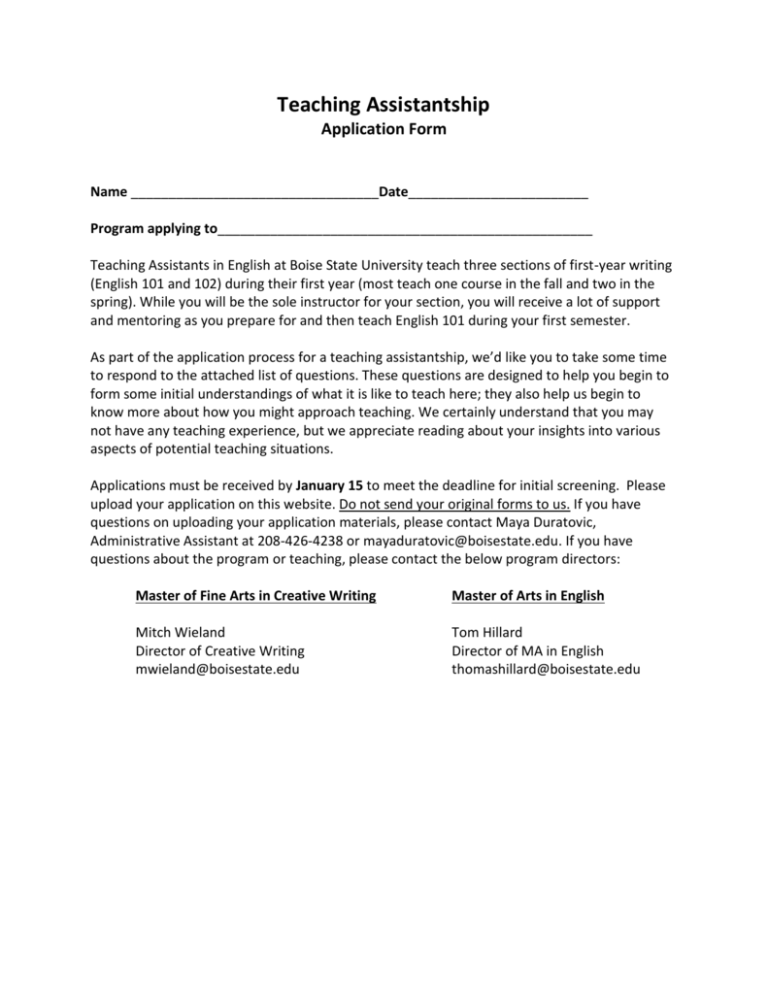
Teaching Assistantship Application Form Name _________________________________Date________________________ Program applying to__________________________________________________ Teaching Assistants in English at Boise State University teach three sections of first-year writing (English 101 and 102) during their first year (most teach one course in the fall and two in the spring). While you will be the sole instructor for your section, you will receive a lot of support and mentoring as you prepare for and then teach English 101 during your first semester. As part of the application process for a teaching assistantship, we’d like you to take some time to respond to the attached list of questions. These questions are designed to help you begin to form some initial understandings of what it is like to teach here; they also help us begin to know more about how you might approach teaching. We certainly understand that you may not have any teaching experience, but we appreciate reading about your insights into various aspects of potential teaching situations. Applications must be received by January 15 to meet the deadline for initial screening. Please upload your application on this website. Do not send your original forms to us. If you have questions on uploading your application materials, please contact Maya Duratovic, Administrative Assistant at 208-426-4238 or mayaduratovic@boisestate.edu. If you have questions about the program or teaching, please contact the below program directors: Master of Fine Arts in Creative Writing Master of Arts in English Mitch Wieland Director of Creative Writing mwieland@boisestate.edu Tom Hillard Director of MA in English thomashillard@boisestate.edu Background Based on what you know about yourself in a variety of learning situations, what do you anticipate will be your strengths as a writing teacher? Your weaknesses? [2-3 paragraphs] Imagining Yourself in the Classroom First-year writing courses at Boise State often include a rich mix of “traditional” (18-19 year old) students and “non-traditional” students (older students, with various family and employment obligations). Further, these students are usually in their very first semester of college; what do you imagine being potentially interesting to you about working with these kinds of students during their transition into college? Challenging? [2-3 paragraphs] Responding to Student Writing Enclosed with this application is an essay-in-progress written by a university English 101 student. This is an early draft, one the student has brought to her peer workshop and to you before she revises it further. At this stage in her process, you will not be grading the essay but focusing on a small handful of suggestions for revision so she may strengthen the essay. 1) Describe the strategies that you would use in attempting to help the student improve the essay in a subsequent revision. (2-3 paragraphs) 2) What is the biggest challenge you have in trying to respond to this draft? How would you deal with this challenge? (2-3 paragraphs) 3) Write a comment addressed to the student-author of the essay where you offer suggestions for revision. The Greater Purpose of Writing Overly long fake nails and pointy rimmed glasses were not the only distasteful qualities Mrs. Jones carried. Her terrible sense of style was simply an addition to her horrible style of teaching. As my seventh grade English teacher she was a terrifying thing to behold and as a result, writing became a threat in itself. She didn’t start out as mean and discouraging, however when it came time to prepare for a state essay test, the beast was unleashed. Everyday in class, our assignment was to write a five paragraph essay based off of the topic of her choice. It wasn’t necessarily the work that was so disheartening, but the response she gave to it each day. I honestly cannot conjure up one useful thing she taught me; all I remember is her tearing my beautiful essays to shreds and saying to do better. What does that mean “do better”? It was impossible to please her and never did she offer suggestions on how to fix whatever it was that needed to be “done better”. I could only take so much criticism. It wasn’t until my confidence in writing was nothing more than a brittle twig. If anything I learned to hate writing. “Research has shown that deficits in skills training and poor or negative teacher responses to early writing attempts apparently affect later levels of writing anxiety. Positive skill development and reinforcement leads to less apprehension.” (Faigley, Daly, and White 1.) Faigley, Daly, and White are professors from the University of Texas at Austin who performed a study on “ The Role of Writing Apprehension in Writing Performance and Competence.” In their study they compare test results between college students who are low apprehensive and high apprehensive writers. According to them writing apprehension is the tendency of people to avoid writing. It is reflected in the behaviors and attitudes they express as they write and their written products. Highly apprehensive writers tend to find writing unrewarding and at times find it punishing. As a result they avoid it all together. Reading that article raises the question why do people take writing so seriously? What is it that causes a teachers response to a written project to be so influential on the outcome of that person as a writer? Sommers and Saltz, two professors that conducted a study on the impacts of writing among college students at Harvard University , quoted a student who when asked what advice she would give to future freshman responded by saying, “See that is a greater purpose in writing than completing an assignment. Try to get something and give something when you write.” We are taught all throughout school that the reason to write is to prove what we know, or it is just simply an assignment that needs completion. Teachers often give writing assignments that seem meaningless to students. The only thing they are good for are to get the grade that says “you pass”. It is interesting that this college student views writing as much more than just a grade. She sees some ‘ greater purpose’ if you will in what writing has to offer. This concept of a greater purpose brings us back to the question of why people take writing so seriously. It seems that there is a level of importance that goes beyond the surface level of writing. Some would argue that writing is important because it plays a massive role in retaining information. By having students write about certain topics, it helps them to learn the material more effectively. “If students are to make knowledge their own, they must struggle with the details, wrestle with the facts, and rework raw information and dimly understood concepts into language they can communicate to someone else. In short, if students are to learn, they must write.” (The Importance Of Writing). Another idea is that writing is essential to being successful in the career world. Based out of “The Importance of Writing,” an article written by a superintendent, “ Writing is a threshold skill for hiring and promotions among salaried or professional employees…You cant move up without writing skills.” The importance of writing in the realm of learning and success still leave us on the surface level. Both concepts are well known and proven. However, the question still remains what is that greater purpose of writing, and why do people take it to heart? Is there something about writing that reveals more than we like to lead on? Not only does writing seem to help solidify information for students, but I also think it has a way of letting them figure out their own ideas and opinions. As I wrote about in our first unit project, I believe writing has a way of portraying ‘ deep secrets’ or ‘unrevealed truths’. It is through this process of getting ones thoughts and opinions on paper that will eventually lead to learning, not just what the topic is about, but a little more about themselves as people. Writing demands a person to examine their own thoughts and ideas, then forces them to think of a way to explain it to the rest of the world on paper. It doesn’t matter what the person is writing about, the examination process of getting words onto paper is bound to turn out an unrevealed truth. Maybe it is something they have thought about before but simply didn’t know how to make sense of; writing simply allows people to organize their thoughts. It helps put things into perspective and creates a level of understanding that was not originally there. Why does this concept of figuring out ones own ideas and opinions hold so much weight? One answer is pride. People tend to take a noticeable amount of pride in what they turn out. Especially if it something they put a lot of effort into. Like anything else that we spend time and energy doing, it is important for us as human beings to get positive feedback when it comes to our writing. Feed back on writing pieces that reveal hidden depths of our own opinions, tend to impact us more than just any old paper. When asked to put personal ideas on paper, it is also asking for vulnerability, criticism towards it is inevitably taken to heart. The things we write can be small definitions of who we are, thus one cannot help but take offence to abusive criticism about their writing. It is personal. We take extreme pride in turning out a compilation of our knowledge, and the feedback we receive can either break us down or encourage us. Who knew the outcomes of such could be so imperative? The kind smile and encouraging words of Mr. Smith were two things I could always count on when getting feedback on a paper for his class. It was he who brought the enjoyment of writing to a level I had not yet experienced. In contrast to that of Mrs. Jones, Mr. Hatch not only encouraged me in my writing but let me feel at ease in putting my ideas on paper. He offered a safe environment for my pride. The final paper I wrote for his class left me feeling successful in depicting the act of Chinese foot binding, while still enabling me to learn more about myself. His response was critical, however I have never felt a paper to be more accomplished. Looking back at the writing apprehension article, it says that highly apprehensive writers will avoid writing all together. If this is true, then what a sad reality it is. As we have seen, writing holds importance not only in its ability to lead us on to bigger and better things in the career world, but also its way of teaching us; teaching us both academically and about ourselves. It cannot be stressed enough that writing holds a greater purpose. That greater purpose is expressed through education and revelation of who we are as humans. The written products we turn out often reveal a deep secret or hidden truth we did not see before. Unless people receive encouragement and reinforcement in their writing it can be detrimental to their future as a writer. I was lucky enough to have the painstaking memories of Mrs. Jones replaced with the encouraging and joyful memories of Mr. Smith. As a result I have overcome my slight writing anxiety and am now embarking on this unending journey of discovery. The greater purpose of writing cannot be reached unless people are properly affirmed in what they write, only then will they too discover all of the depths writing has to offer. Works Cited Bruce, Harter. “The Importance of Writing” Dec. 2004. Oct. 24, 2006 < http://www.bsd.k12.de.us/search.htm> Faigley, Lester and John A. Daly and Stephen P. Witte. “The Role of Writing Apprehension in Writing Performance and Competence.” Vol. 75 (No.1) (Sept/ Oct. 1981): 16-21 Sommers, Nancy and Laura Saltz. “The Novice as Expert: Writing the Freshman Year.”CCC 56.1 (September 2004): 124-149.

